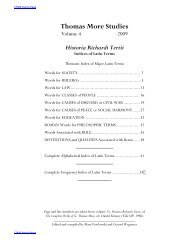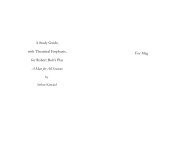LEWIS the LOST LOVER - The Center for Thomas More Studies
LEWIS the LOST LOVER - The Center for Thomas More Studies
LEWIS the LOST LOVER - The Center for Thomas More Studies
You also want an ePaper? Increase the reach of your titles
YUMPU automatically turns print PDFs into web optimized ePapers that Google loves.
<strong>More</strong>‟s Fortune Poems of 1535 -- Modernized<br />
<strong>LEWIS</strong> THE <strong>LOST</strong> <strong>LOVER</strong> (c. 1535) 1<br />
Eye 2 -flattering <strong>for</strong>tune, look thou never so fair, 3<br />
Nor never so pleasantly begin to smile,<br />
As though thou would my ruin all repair,<br />
During my life thou shalt me not beguile.<br />
Trust shall I God, to enter in a while, 5<br />
His haven of heaven ever sure and uni<strong>for</strong>m:<br />
Ever after thy calm, look I <strong>for</strong> a storm.<br />
1 Source text <strong>for</strong> modernization comes from <strong>The</strong> English Works of <strong>Thomas</strong> <strong>More</strong>, editors W.E. Campbell,<br />
A.W. Reed, R.W. Chambers, and W.A.G. Doyle-Davidson, vol. 1 (London: Eyre and Spottiswoode<br />
Limited, 1931). Cited as “Campbell and Reed” hereafter. William Roper includes this poem in his<br />
biography of <strong>Thomas</strong> <strong>More</strong>. Roper writes that shortly after <strong>the</strong> [May 4, 1535] execution of four monks,<br />
Secretary Cromwell visited <strong>More</strong> in his prison cell. Cromwell said he came to “com<strong>for</strong>t” <strong>More</strong> with a<br />
message that “<strong>the</strong> King‟s Highness was his good and gracious lord and minded not with any matter,<br />
wherein he [<strong>More</strong>] should have any cause of scruple, from hence<strong>for</strong>th to trouble his conscience.”<br />
Immediately after this visit, according to Roper, <strong>More</strong> wrote this poem and, according to S.G. Edwards,<br />
probably “Davy <strong>the</strong> Dicer” as well. On dating <strong>the</strong> poems, see introduction to <strong>The</strong> Complete Works of<br />
<strong>Thomas</strong> <strong>More</strong>, vol. 1, editors Anthony S.G. Edwards, Ka<strong>the</strong>rine Rodgers, Clarence H. Miller (New Haven:<br />
Yale University Press, 1997), xxxii. Cited as “S.G. Edwards” hereafter.<br />
2 <strong>The</strong> “Ey” of <strong>the</strong> original, Sylvester suggests to be “Ah.” See <strong>Thomas</strong> <strong>More</strong>: <strong>The</strong> History of Richard III<br />
and Selections from <strong>the</strong> English and Latin Poems, ed. Richard Sylvester (New Haven: Yale University<br />
Press, 1976); hereafter cited as “Sylvester.”<br />
3 Fair beautiful
DAVY THE DICER (c. 1535) 4<br />
Long was I, lady luck, 5 your serving man, 6<br />
And now have I lost again all that I got, 7<br />
Where<strong>for</strong>e when I think on you now and <strong>the</strong>n,<br />
And in my mind remember this and that,<br />
You may not blame me though I beshrew 8 your cat, 9 5<br />
But in faith I bless you again a thousand times, 10<br />
For lending me now some leisure 11 to make rhymes.<br />
4 S.G. Edwards observes that dice was used <strong>for</strong> answering questions about <strong>the</strong> future; such determinations<br />
were made by <strong>the</strong> correspondence of <strong>the</strong> numbers thrown to <strong>the</strong>ir assigned fates in <strong>the</strong> “book of <strong>for</strong>tune”<br />
(xxx). So it is that <strong>the</strong> speaker comments on this kind of dicing from <strong>the</strong> Book of Fortune: “<strong>The</strong> rolling<br />
dice in which your luck doth stand / With whose unhappy chance ye be so wroth, / Ye know yourself came<br />
never in mine hand” (Book of Fortune, <strong>Center</strong> <strong>for</strong> <strong>Thomas</strong> <strong>More</strong> <strong>Studies</strong> Website, lines 218-220).<br />
5 According to <strong>the</strong> OED, this is <strong>the</strong> first time that luck is personified as a lady in English.<br />
6 <strong>The</strong> poem represents a dialogue between <strong>the</strong> speaker and a personified figure of luck in which we hear<br />
only <strong>the</strong> response of <strong>the</strong> speaker. Accordingly, we separate “lady luck” with commas to show <strong>the</strong> poem‟s<br />
addressee.<br />
7 “Got” used <strong>for</strong> <strong>the</strong> original “gate.”<br />
8 “Beshrew” probably means one of <strong>the</strong> following: “treat evilly, use ill, abuse,” or “to wish all that is bad,”<br />
or as an “imprecatory expression” (a curse) such as “evil befall <strong>the</strong>e” (OED). All three senses give <strong>More</strong><br />
room to play: He may be cursing lady luck <strong>for</strong> cursing him with bad luck, or he may be wishing her ill as<br />
she caused ill to befall him, or he may mean to evilly use her as she evilly used his devotion.<br />
9 Sylvester notes that „to turn <strong>the</strong> cat‟ was a term used in dicing, which meant “to reverse <strong>the</strong> order of things<br />
so dexterously as to make <strong>the</strong>m appear <strong>the</strong> opposite of what <strong>the</strong>y really were”; according to how “beshrew”<br />
is taken, <strong>the</strong>n, <strong>More</strong> means to curse <strong>for</strong>tune‟s reversals, to wish ill towards <strong>for</strong>tune‟s reversals, or to evilly<br />
use <strong>for</strong>tune‟s reversals in his verse. As <strong>the</strong> language indicates, <strong>the</strong> point remains that <strong>More</strong>‟s speaker now<br />
controls <strong>for</strong>tune, or lady luck.<br />
10 Note <strong>the</strong> ambiguity involved in <strong>the</strong> word “faith” and “bless.” In Christian “faith,” <strong>More</strong> may now “bless”<br />
lady luck because he is free from superstition, or “in faith” he simply thanks lady luck <strong>for</strong> sending him<br />
“leisure”—a blessing.<br />
11 Leisure used here <strong>for</strong> <strong>the</strong> original “laisour.” Leisure means ei<strong>the</strong>r “having time at one‟s own disposal” or<br />
“freedom or opportunity to do something specified” (OED). If <strong>More</strong> did compose “Davy” while in prison,<br />
note <strong>the</strong> irony involved in using <strong>the</strong> word.











